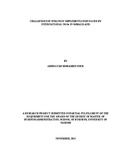| dc.description.abstract | Strategic management process is a full set of commitments, decisions, and actions required for a firm to achieve strategic competitiveness (Hitt et al., 2011). Thus strategy implementation is regarded as the actions required to undertake in order to achieve competitive advantage. However, during strategy implementation there are challenges that hinder smooth implementation of the strategy plans and it is impossible to foresee all the problems that will arise during implementation. Therefore, the study was aimed at identifying strategy implementation challenges faced by INGOs in Somaliland. The research question was answered through the use of cross-sectional study. The reason of applying cross-sectional design is because data was collected at one point in time. The population of the study was 70 active INGOs registered under Somaliland ministry of planning. 25% sample size was selected purposively from INGOs that operated more than five years. 83% of the sampled INGOs responded the questionnaire and 17% did not respond and declined to fill in the questionnaire. The study collected primary data which was analyzed using descriptive statistics including frequencies tables, percentages, mean scores, standard deviation, ranking orders, and pie and bar charts. The study found that all INGOs operating in Somaliland have mission statement, strategy plans, and annual objectives. Majority of the INGOs have vision statement, and functional strategies. Most of the INGOs applied formal planning practices. Greater part of the INGOs revealed that program strategies, functional strategies, and annual objectives are derived from corporate strategy in combination with donor guidelines, management meetings, and stakeholders’ feedback among others. Majority of the NGOs refer strategy plan when developing project proposals. The study established eight main strategy implementation challenges faced by INGOs in Somaliland. Eight major problems that were identified in the study included co-ordination was not sufficiently effective, people were not measured or rewarded for executing the plan, insufficient financial resources to execute the strategy, major problems surfaced which had not been identified earlier, changes in security levels impact implementation, took more time than originally allocated, lack of stakeholder commitment, and key formulators of the strategic decision did not play an active role in implementation. Lastly, the study established that majority of the INGOs reviewed their strategy plans on yearly basis. Also, most of INGOs frequently achieved their intended outcome and in that regards, they also achieved their financial targets that enabled them to reach the target goals while operating within allocated resources. | en |

